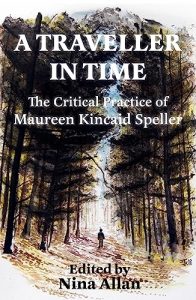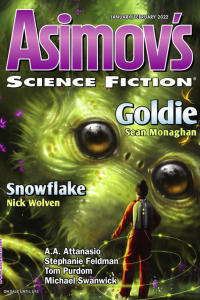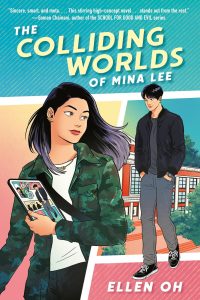Ian Mond Reviews A Traveller in Time: The Critical Practice of Maureen Kincaid Speller by Maureen Kincaid Speller
 A Traveller in Time: The Critical Practice of Maureen Kincaid Speller, Maureen Kincaid Speller (Luna Press 978-1-91555-620-2, £16.99, 308pp, tp) September 2023.
A Traveller in Time: The Critical Practice of Maureen Kincaid Speller, Maureen Kincaid Speller (Luna Press 978-1-91555-620-2, £16.99, 308pp, tp) September 2023.
I never had the pleasure of meeting Maureen Kincaid Speller in person, but we corresponded on email and social media. Talking virtually with Maureen was always a delight, moreso when she approached me to review Rod Duncan’s Unseemly Science for Strange Horizons. The deep sadness I felt when Maureen passed last year surprised me until I realised the profound effect she had on my development as a critic. Partly, it was her nurturing approach to editing (the notes she gave me on my review of Matt Ruff’s Lovecraft Country improved the piece immeasurably). Mostly, however, it was her critical work, which I loved reading on Strange Horizons and her blog, Paper Knife, that encouraged me to take criticism seriously (websites like Maureen’s inspired my short-lived blog, The Hysterical Hamster). So, when I saw that Nina Allan was editing a collection of Maureen’s criticism, I immediately asked to review it. A Traveller in Time: The Critical Practice of Maureen Kincaid Speller is a terrific sampling of Maureen’s criticism, each piece illustrating not only her desire to engage with the work but also the broader genre and literary community.
Allan has assembled 49 reviews and essays spread over three decades. But as Dan Hartland and Aishwarya Subramanian (the current review editors at Strange Horizons) point out in their lovely essay that concludes the collection, the majority were published after 2010. Rather than go chronologically, Allan separates the work into six thematic sections, covering an aspect of Maureen’s writing, whether it be film reviews, book reviews or a section devoted to marginalised writers (such as people of colour and women). It’s a terrific way of organising the book, highlighting Maureen’s passion for an eclectic series of topics. It does mean that we don’t see Maureen’s view develop over time (something that was gratifying about Niall Harrison’s essay collection, All These Worlds, published earlier this year), but what’s striking about Maureen is that while I’m sure her opinions matured over the years, her voice, as film critic Jonathan McCalmont rightly states in his essay, never much changes, ‘‘a voice that somehow is always on brink of both exasperation and child-like glee.’’
In her amusing and discerning review of Alan Garner’s Treacle Walker (‘‘The Critic and the Clue: tracking Alan Garner’s Treacle Walker’’), Maureen says this of non-fiction reviewers: they frequently resort ‘‘to summarising the contents of a book in lieu of engaging with its argument or passing any kind of judgement on it.’’ Apart from being one of the many sharply observed asides that pepper her work, I’m compelled to ask: Is there a thesis that ties Maureen’s work together? The answer is yes, and it’s apparent in the piece that opens the collection, a 2015 post from Paper Knife, ‘‘{and then} – a writing life beyond reviews’’, that, amongst other things (including biographical titbits such as how Paul Kincaid convinced Maureen to start writing reviews) outlines her position on criticism. Like the essay and reviews that are to come, it’s a reflective piece of writing, full of self-doubt, where Maureen ponders whether she has become too picky:
Is an awful lot of contemporary science fiction and fantasy as flimsy as I think it is? Am I too demanding as a reviewer? Too fussy? Looking for things it unreasonable of me to expect to find?
The portrait that emerges from the essay is the critic more interested in engaging with other readers – either through her criticism or social media – than courting publishers so she can be the first to review the ‘‘New Shiny.’’ In his elegant, beautiful foreword, the critic Paul Kincaid (and Maureen’s husband) frames it thusly: ‘‘Her reviews were never meant to be the last word on any book,’’ but rather a ‘‘bridge between book and reader in the ongoing, unending conversation that is literature.’’
We see Maureen constructing that bridge across the whole collection. It’s evident when she is arguing with Margaret Atwood for adopting a narrow or inconsistent definition of science fiction (‘‘Reading Margaret Atwood’s In Other Worlds: SF and the Human Imagination’’); or when she’s cocking an eyebrow at the genre community’s less than enthusiastic reaction to Marge Piercy winning the Clarke Award in 1993 (‘‘A Judge’s Summary of the Clarke Award’’); or when she’s eviscerating John Mullan’s piece in The Guardian on George R.R. Martin’s A Game of Thrones, where she notes that Mullan fails ‘‘to recognise that literary fiction is itself a genre, with distinctive characteristics of its own, characteristics that Mullan himself has delineated in various articles’’ (‘‘We Need To Talk About Dragons – John Mullan, George R.R. Martin, A Game of Thrones and the Triumph of Fantasy Fiction’’). In all three instances, Maureen – even when she’s being snarky, especially when she’s being snarky – makes the case for a more inclusive, broader, and less parochial view of genre fiction – a bridge that brings the islands of literary and genre together.
A highlight of the collection, of which there are many – Maureen’s review of Star Wars: The Force Awakens is as hilarious and irreverent as it is heartfelt, infused with nostalgia and delight – is her critical reaction to the fiction of Alan Garner. At this point, I must confess to not having read Garner (I’ve always meant to, but never got around to him). Reading Maureen’s five pieces on Garner made me want to drop everything and pick up either The Owl Service or Red Shift (or both). These pieces aren’t a hagiography, but rather Maureen re-engaging with an author she has always loved, discovering aspects of his work that make her uneasy. It’s insightful, intimate, and provocative – Maureen received push-back from Garner fandom for her views that Garner’s creation myth, the story of his family and hometown of Cheshire, is ‘‘built in part on appropriation’’ – revealing the complexities, both positive and negative, of Garner’s work, that entices a novice like me to embark on a journey she started decades previously.
The great sadness of finishing A Traveller in Time is that I can’t tell Maureen how much I loved the book or argue with her about spoilers (she’s fine with them in reviews) and Steven Moffat (she’s not keen). But that sadness is somewhat mollified with the knowledge that her voice and her legacy will live on, that through this book, she will continue to be an inspiration, a bridge builder, for so many of us in the genre community.
Ian Mond loves to talk about books. For eight years he co-hosted a book podcast, The Writer and the Critic, with Kirstyn McDermott. Recently he has revived his blog, The Hysterical Hamster, and is again posting mostly vulgar reviews on an eclectic range of literary and genre novels. You can also follow Ian on Twitter (@Mondyboy) or contact him at mondyboy74@gmail.com.
This review and more like it in the November 2023 issue of Locus.
 While you are here, please take a moment to support Locus with a one-time or recurring donation. We rely on reader donations to keep the magazine and site going, and would like to keep the site paywall free, but WE NEED YOUR FINANCIAL SUPPORT to continue quality coverage of the science fiction and fantasy field.
While you are here, please take a moment to support Locus with a one-time or recurring donation. We rely on reader donations to keep the magazine and site going, and would like to keep the site paywall free, but WE NEED YOUR FINANCIAL SUPPORT to continue quality coverage of the science fiction and fantasy field.
©Locus Magazine. Copyrighted material may not be republished without permission of LSFF.







